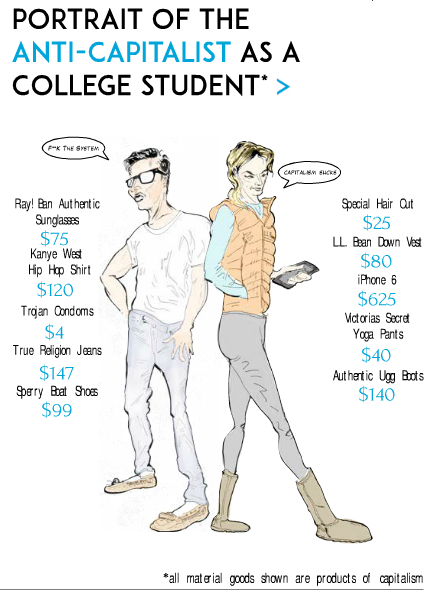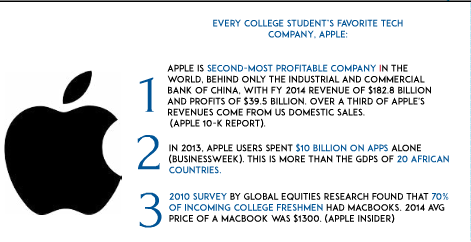Anatomy of a Campus Anti-Capitalist
How do you spell “campus hypocrite”? A-n-t-i-c-a-p-i-t-a-l-i-s-t.

The opinion of capitalism as the greatest evil known to man is not only the dominant view at Cornell and other college campuses, it is the irrefutable dogma of the mindless droves of the overwhelming majority of faculty and students.
They look at the injustices in the world, at the inequities, and to the ill-fated, and assume capitalism is to blame.
It’s an assumption of guilt before innocence in order to make capitalism—a simple system of private property, free enterprise, and free exchange—into a scapegoat for them to explain away their own insecurities, self-loathing, and inability to accept the world as it is.
Anti-capitalists on campus can roughly be divided into two groups: the activists and the academics.
The screaming and hollering activists feel sorry for themselves because capitalism does not reward their invaluable skill-set of marching, poster-making, and spoken-word poetry. Instead of obtaining the education and skills that markets demand, they attempt to use force, intimidation, and sheer numbers to get what they want. They are motivated by a deep-seated, unrelenting sense of entitlement.
The academics closet themselves from reality with a vain pursuit of theoretical perfection. To them, every little imperfection in a capitalist economy is a call to arms (and another paper on the road to tenure). They, along with the activists, forget that capitalism is exclusively to credit for bringing man out of mud and caves to interstellar capsules, from sticks and rocks to 3D-printing devices, and from scavenging for grass and weeds to a world of leisure and entertainment at one’s fingertips.
It is the student activists, though, that are particularly egregious in their hypocrisy. (At least the academics try to justify their anathema towards capitalism with their research and writing.)
Dressed in designer clothes and shoes and clutching their smart phones and espressos, they snarl at the detestable 1% and lament the pernicious flow and concentration of capital.
As copies of Das Kapital jostles alongside iPads in their name-brand backpacks, their conversations alternate between what fraternities are throwing parties that night to the dastardly deeds of the bespectacled robber barons of Wall Street. In class, they ignore lecture and shop online, and intermittently make posts on Facebook and Twitter about how much they loathe mindless consumerism. Their online audience, however, is too engrossed in their own online shopping and gaming to take notice.
How often do we witness such grotesque hypocrisy on this campus, and, undoubtedly, at college campuses across the nation?
We see almost constantly that, though they hate the idea of having to earn money, they love to spend it; though they hate corporations, they love to buy their products and services; though they hate wealthy entrepreneurs, financiers, etc., they love Hollywood celebrities and pro-athletes.
The reason the campus anti-capitalists prosper is because no one calls them out for their hypocrisy—an internal contradiction of the mind and spirit so egregious that it surely would cripple any other type of person. Almost always, the most virulently anti-capitalist sorts happen to also be the most eager and enthusiastic to engage in the capitalist system. If they are challenged, they quickly point out the near impossibility of living in the developed world without engaging in the (marginally) free market system. Even if their hearts are not in it, they can only acquire basic goods and services by aiding and abetting capitalist system.
A true “revolutionary” rejects that which he deems evil–he does not invent lame excuses to justify his flirtation or fully engaged involvement with such evil. A true anti-capitalist would do all in his power to avoid the capitalist system by becoming, for example, a self-sustaining hermit.
In close, I would suggest to all those at Cornell and beyond who fancy themselves as anti-capitalists to imagine their neat, comfortable lives without capitalism: shivering naked in a muddy hovel furiously twisting damp twigs to spark a fire to warm some dirty water in order to make an espresso.
Article originally posted at The Cornell Review.
 DONATE
DONATE
Donations tax deductible
to the full extent allowed by law.











Comments
These are the leaders of tomorrow? Only in Never-Never Land. These children will never grow up.
Perhaps they will never grow up, but look how far that has taken Bill and Hillary Clinton, Obama, Holder, Moonbeam Brown…
These are most likely the agitators of tomorrow. Relegated to a long life of unhappiness, those who don’t grow up in worldview as they grow older will probably be constantly marching and protesting. And miserable.
And given how quickly a fair portion of the country has soured with the first experience in leadership from a disgruntled community organizer, I doubt we will see a lot of future leaders emerge from this next generation of 1%-hating malcontents. On a local level, sure, perhaps.
When you loose the “kids” as quickly as Obama has, there’s hope reality overtakes idealism sooner than later.
Just useful idiots following fashion, even if it leads them off a cliff – which it will.
Oh, they’re gonna love taking orders at that first entry level job.
Wrong. Capitalism is “screw you, I got mine,” exploitation of the 99% by the 1%ers with their bought-and-paid-for Legislature cheering it on.
I’m going to go out on a limb and take you seriously. It’s a long limb.
Socialism/communism is “screw you, I got mine” exploitation of the 99% by the 1% of government and crony big industry elites. I’ll take capitalism any day.
All economic systems which have been tried, other than capitalism, have resulted in epic misery because they require a different kind of human nature than that which actually exists.
If you succeeded in getting rid of capitalism and were lucky enough to survive the result, you would be living in a depopulated world in which life was nasty, brutish, and short. For your own sake, I hope you fail.
Hahaha. Pretty clear who came in and down voted the preceding posts.
While we might agree the wealthy buy politicians, and just as many Dems as GOPers, the rest of what you say is academic drivel.
Check out Dave Ramsey’s new book: Legacy Journey.
He does an awesome job of skewering these twits while calling out what it means to create multi-generational wealth.